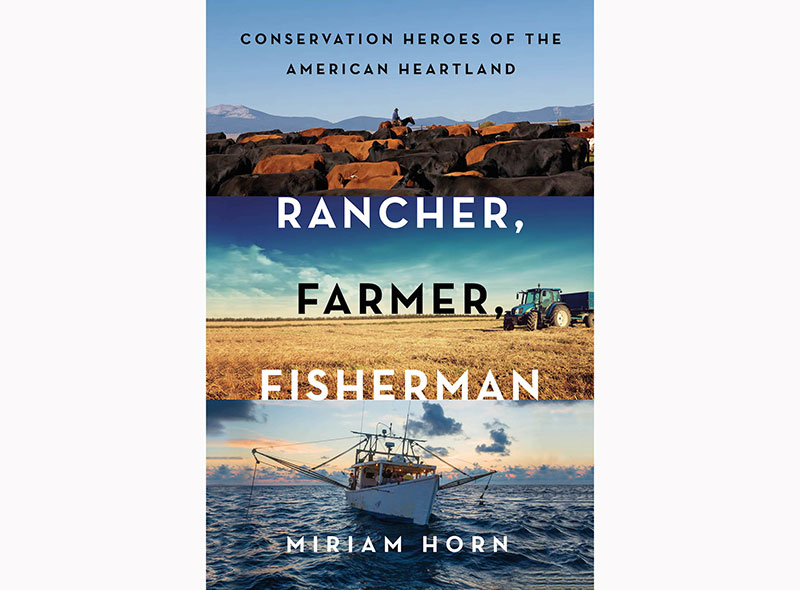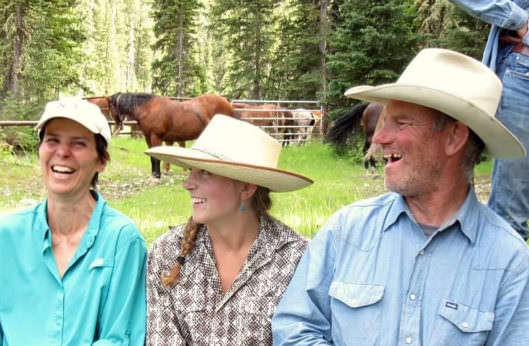Heroes of the Heartland: A Chat with Author Miriam Horn
Miriam Horn’s new book, “Rancher, Farmer, Fisherman,” smashes notions about what it means to be a sustainable producer.
Heroes of the Heartland: A Chat with Author Miriam Horn
Miriam Horn’s new book, “Rancher, Farmer, Fisherman,” smashes notions about what it means to be a sustainable producer.

The book tells the stories of five unlikely conservationists along the Mississippi watershed: Dusty Crary, a Montana rancher; Justin Knopf, a Kansas farmer; Merritt Lane, a Mississippi riverman; Sandy Nguyen, a Louisiana shrimper; and Wayne Werner, a Gulf Coast fisherman. Horn spent three years traveling, researching, and writing the book, visiting her subjects throughout the seasons: to Montana, for instance, during calving season; to Kansas for wheat planting; and to 90 miles out in the Gulf to catch red snapper.
What seems like an up-to-the-minute story about the intersection of agriculture and environmental issues becomes, in the hands of Horn, a story about the histories of both the people she’s writing about and the land they call home, giving us a deeper understanding of both. None of her five subjects would likely call themselves conservationists, but never the less have dedicated their lives to protecting the heritage and natural wealth of their regions by bringing together disparate groups of people – from politicians to large landowners to hardcore environmentalists – in order to ensure future generations will be able to enjoy the continued bounty of the land and sea.
By day, Horn works at Environmental Defense Fund (EDF), a non-profit environmental advocacy group, which often works with big farms and commercial fisheries in order to protect the environment – from grasslands to wildlife to soil – on a massive scale. She grew up in the San Francisco Bay area, and spent much of her time at a friend’s farm in the Central Valley. She also spent time in the company of conservationists and scientists, who were friends of her family, which had a powerful effect on her as well. “The seeds were planted in those early experiences but the idea [for the book] really coalesced 12 years ago, soon after I began working at Environmental Defense Fund,” Horn tells Modern Farmer.
Horn took some time to talk with Modern Farmer about her new book and the people she calls “conservation heroes of the American heartland.”

Modern Farmer: It seems that all of your subjects shared the ability to see beyond their own viewpoint and work with people very different from themselves for the greater good. Did you find this to be true?
Miriam Horn: Yes, in an era when many insist on an uncompromising certainty in their way of seeing and acting in the world, there are still great numbers of people out there open to other perspectives and even welcoming of challenges to their own thinking and practices. Dusty [Crary] and a few fellow ranchers spent seven years around kitchen tables with hunters and loggers and “greenies” and federal bureaucrats designing a federal bill to protect 300,000 acres of public land, “thrashing it out” acre by acre.
Justin [Knopf] and the 2,000 other large-scale heartland farmers who come together every year for the No-Till On The Plains conference had read concerning reports about the neonicotinoid pesticides some of their families had been using for years. Instead of circling the wagons, they invited Jonathan Lundgren, one of the most prominent critics of the insecticides, to come speak.
Another shared attribute is tremendous courage – when these families are experimenting with a hands-off approach to their cattle, or with planting cover crops of rye after spending half their lives roguing it out [removing it] from their wheat fields, they’re putting their family’s heritage and livelihood on the line.
The people out there on the tractors and barges and fishing boats understand it as well as anyone, and know that long-term survival requires a changed relationship with nature – not as something to be dominated or exploited, but as an ally of immense mystery and power.
MF: What was the most surprising thing you learned while working on the book?
MH: I guess it was the degree to which the conversation around climate change is coming out of hiding. When Justin took me up to meet his mentors at Kansas State, they talked openly about how climate change was beginning to stress water supplies and yields (though acknowledging that when they go to talk to their state legislators, they talk a bit indirectly, focusing on the vanishing Ogallala aquifer). The mainstream ag press and “suits” – from John Deere to the food buyers at Walmart – are also addressing it head-on. And these big farmers are talking not only about the need for greater resilience to extreme weather but also about ways they can reduce their nitrous oxide emissions and store more carbon in their soils to help turn back the disaster.
MF: In the end, what would you say are some of the most crucial points you feel readers will take away from the book?
MH: That there are no simple, perfect, universal answers: Agriculture can’t be formulaic or dogmatic because, as Justin says, “diverse ecosystems require diverse practices.” And that the understanding of our interdependence with nature is not limited to liberal, elitist enclaves. Quite the contrary: The people out there on the tractors and barges and fishing boats understand it as well as anyone, and know that long-term survival requires a changed relationship with nature – not as something to be dominated or exploited, but as an ally of immense mystery and power.
MF: One of the things I loved about the book was the sense of deep history, but also the fact that you’re exploring very current events. Have you considered the idea of perhaps revisiting your subjects sometime in the future to see how and if their efforts have continued to pay off?
MH: I love that idea. So far, the conservation work of these heroes has also helped them to be more economically sustainable. Even as average yields in Kansas have been as erratic as the weather, Justin’s yields have stayed steady and high. Wayne Werner’s leadership in revising fisheries policy has brought red snapper – depleted almost beyond recovery – back to abundance, reviving fishing incomes and communities. But droughts are only going to get longer and hotter, the oceans only warmer and more acidic. It will take all their innovative energies and democratic skills to stay ahead of those growing dangers.
Follow us
This work is licensed under a Creative Commons Attribution-NoDerivatives 4.0 International License.
Want to republish a Modern Farmer story?
We are happy for Modern Farmer stories to be shared, and encourage you to republish our articles for your audience. When doing so, we ask that you follow these guidelines:
Please credit us and our writers
For the author byline, please use “Author Name, Modern Farmer.” At the top of our stories, if on the web, please include this text and link: “This story was originally published by Modern Farmer.”
Please make sure to include a link back to either our home page or the article URL.
At the bottom of the story, please include the following text:
“Modern Farmer is a nonprofit initiative dedicated to raising awareness and catalyzing action at the intersection of food, agriculture, and society. Read more at <link>Modern Farmer</link>.”
Use our widget
We’d like to be able to track our stories, so we ask that if you republish our content, you do so using our widget (located on the left hand side of the article). The HTML code has a built-in tracker that tells us the data and domain where the story was published, as well as view counts.
Check the image requirements
It’s your responsibility to confirm you're licensed to republish images in our articles. Some images, such as those from commercial providers, don't allow their images to be republished without permission or payment. Copyright terms are generally listed in the image caption and attribution. You are welcome to omit our images or substitute with your own. Charts and interactive graphics follow the same rules.
Don’t change too much. Or, ask us first.
Articles must be republished in their entirety. It’s okay to change references to time (“today” to “yesterday”) or location (“Iowa City, IA” to “here”). But please keep everything else the same.
If you feel strongly that a more material edit needs to be made, get in touch with us at [email protected]. We’re happy to discuss it with the original author, but we must have prior approval for changes before publication.
Special cases
Extracts. You may run the first few lines or paragraphs of the article and then say: “Read the full article at Modern Farmer” with a link back to the original article.
Quotes. You may quote authors provided you include a link back to the article URL.
Translations. These require writer approval. To inquire about translation of a Modern Farmer article, contact us at [email protected]
Signed consent / copyright release forms. These are not required, provided you are following these guidelines.
Print. Articles can be republished in print under these same rules, with the exception that you do not need to include the links.
Tag us
When sharing the story on social media, please tag us using the following: - Twitter (@ModFarm) - Facebook (@ModernFarmerMedia) - Instagram (@modfarm)
Use our content respectfully
Modern Farmer is a nonprofit and as such we share our content for free and in good faith in order to reach new audiences. Respectfully,
No selling ads against our stories. It’s okay to put our stories on pages with ads.
Don’t republish our material wholesale, or automatically; you need to select stories to be republished individually.
You have no rights to sell, license, syndicate, or otherwise represent yourself as the authorized owner of our material to any third parties. This means that you cannot actively publish or submit our work for syndication to third party platforms or apps like Apple News or Google News. We understand that publishers cannot fully control when certain third parties automatically summarize or crawl content from publishers’ own sites.
Keep in touch
We want to hear from you if you love Modern Farmer content, have a collaboration idea, or anything else to share. As a nonprofit outlet, we work in service of our community and are always open to comments, feedback, and ideas. Contact us at [email protected].by Andrew Amelinckx, Modern Farmer
September 29, 2016
Modern Farmer Weekly
Solutions Hub
Innovations, ideas and inspiration. Actionable solutions for a resilient food system.
ExploreExplore other topics
Share With Us
We want to hear from Modern Farmer readers who have thoughtful commentary, actionable solutions, or helpful ideas to share.
SubmitNecessary cookies are absolutely essential for the website to function properly. This category only includes cookies that ensures basic functionalities and security features of the website. These cookies do not store any personal information.
Any cookies that may not be particularly necessary for the website to function and are used specifically to collect user personal data via analytics, ads, other embedded contents are termed as non-necessary cookies.